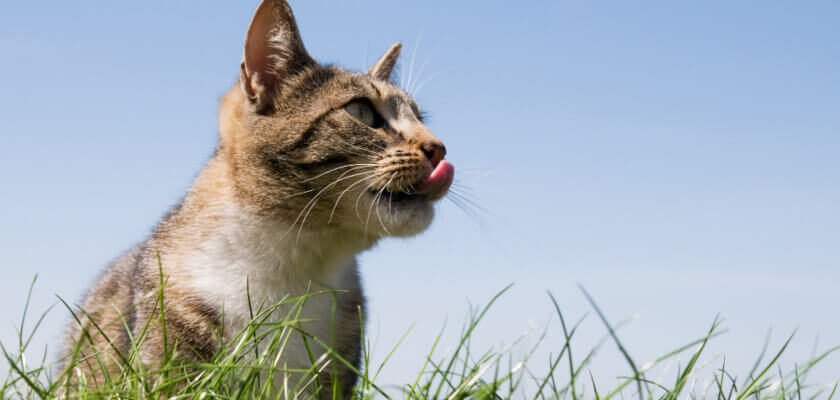Cats are resourceful animals. Equipped with a comb-like tail, they groom themselves without any water. Even though they are domesticated, they can hunt their own food. And, in addition – they use self-healing techniques that help them cure different kinds of issues. Eating grass can fall under this category.
Cats graze quite often, and there is nothing wrong with it. If you notice your pet snacking on some strands from your lawn, don’t discourage it from doing so. Sometimes the owners assume the grass is not healthy for the pet and try to prevent it from accessing it. But the truth is, it’s rather the opposite – the felines can benefit from eating grass. In what way?
Why do the cats eat grass?
There are a few different reasons why cats eat grass. They all have a common denominator – self-healing.
Eating grass as a way to clear the gastrointestinal tract
The grass contains fiber which stimulates intestinal peristalsis. Since it’s resistant to digestive enzymes, fiber works as a broom that removes all the undigested leftovers from the guts. It’s essential for our digestive systems as their accumulation may lead to serious digestive issues or cancer.
Fiber has great importance in a human diet, and so it does in the feline’s one. There is not much of it in the cats’ diet – since they’re carnivores, their diet consists mainly of meat. The fiber in the grass can sweep up the rest of undigested food from their intestines. At the same time, it helps to remove toxins, bile, and other undesirable elements, like parasites.
Grass eating as a way to remove the fur from the digestive system
The cats spend a big part of their day grooming. Their tongue collects the excessive fur, which lands in their digestive system. That can lead to the formation of hairballs, which cause discomfort to cats. Coughing them up is often painful and may make the pet vomit.
Eating grass can prevent the formation of hairballs and make their removal much easier.
Grass eating as a way to supplement nutrients
The grass is the source of fiber but also minerals, vitamins, enzymes, and chlorophyll. If your cat snacks it from time to time, it may mean that its diet is lacking some nutrients.
Chlorophyll has antioxidant properties, so the pet can definitely benefit from consuming it! The cat may eat grass to supplement the folic acid, too. It’s naturally synthesized in the guts, but the animals can supplement it with plant sources in the case of deficits. Folic acid is a vitamin that stimulates the production of hemoglobin, which transports oxygen to the cells. Pregnant cats may need its supplementation, since it’s responsible for the development of the fetus’s nervous system.
Should you be worried if your cat eats grass?
As we’ve already mentioned, eating grass is a natural, instinctive thing to do for felines. But if your cat does it excessively, it may be a sign that the food you provide it with lacks some nutrients and quality. Another possibility is that it has a parasite issue and consuming grass is a way to deal with it. However, it’s more likely for the dogs than cats.
Frequent green snacks often signalize that there is something wrong with the cat’s digestive system. Thus, if you observe such behaviors, it’s worth visiting a veterinarian in order to find their cause.
If your cat is eating large amounts of grass at a fast pace, it most likely suffered some food poisoning. Consuming a lot of grass may make the animal vomit, which speeds up the removal of unwanted elements from the stomach.
Just as any other compulsive behavior, excessive grass consumption can originate from stress and anxiety. Animals may use it as a coping strategy, similar to excessive grooming or marking their territory. If you suspect such an issue, visit a behaviorist to understand it better and find solutions.
How to prevent poisoning with a plant?
If you have a garden, the cat is safe giving a bite on your lawn. In the apartments, things get a bit more tricky since the conditions enable growing potted plants only. And many of the most popular plants are poisonous for pets.
If you have an animal at home, it’s worth carefully selecting the species to plant. Isn’t it enough to distribute the plants in a thoughtful way? Even if you place it in a technically unavailable place, don’t forget that cats are true acrobats. Your kitty will most likely find access to the plant if only it wants to.
So, which plants to avoid? Among the poisonous popular potted plants, there are:
- alocasia
- spathiphyllum
- oleander
- ficus (different subspecies)
- dieffenbachia
- monstera
- dracena
To avoid poisoning, you can also plant grass in a pot and leave it in an accessible place for the cat. Remember to choose an appropriate cat grass, like oats or papyrus. You can buy it, for instance, in the zoological shops.
Similar Posts:
- Why Do Dogs Eat Grass?
- Do Cats Fart? Things You Should Know About Feline Flatulence
- Can Dogs Eat Cat Food? Is Kitty Food Safe for Dogs?
- Can Cats Eat Strawberries? Why Do Cats Like Strawberries?
- Can Cats Eat Dog Food? Cat Food Is Formulated Differently for a Reason
- Can Cats Eat Bananas? Are There Any Benefits?
- Can Cats Eat Watermelon? How Beneficial Is It?
- Can Dogs Eat Tomatoes and Tomato Sauce? How to Safely Feed Your Dog Tomato

